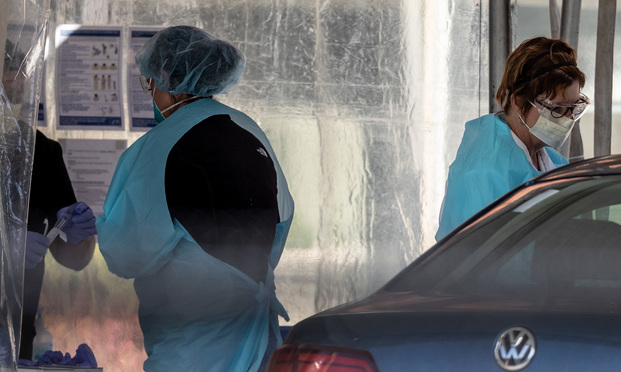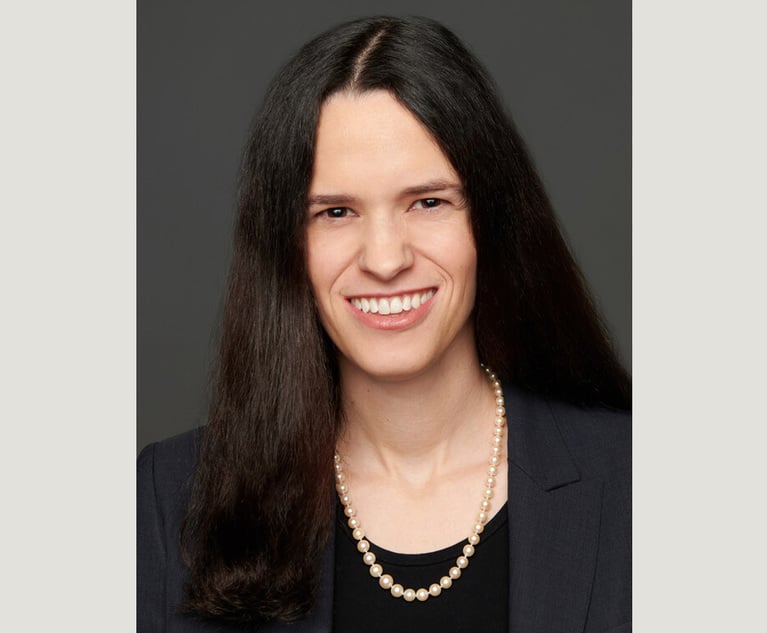Tech Giants Pledge Their IP to COVID-19 Fight
Amazon, Facebook, HPE, IBM, Microsoft and Sandia Labs sign onto the Open COVID Pledge. Meanwhile, pledge organizers have unveiled a new, streamlined version of their license template.
April 21, 2020 at 01:17 PM
5 minute read
 Kaiser Permanente medical staff test a patient for COVID-19 at a drive-through facility in San Francisco. (Photo: Jason Doiy/ALM)
Kaiser Permanente medical staff test a patient for COVID-19 at a drive-through facility in San Francisco. (Photo: Jason Doiy/ALM)The Open COVID Pledge has added a big group of tech heavy hitters.
IBM Corp., Microsoft Corp., Amazon.com Inc., Facebook Inc., Hewlett Packard Enterprise Co. and Sandia National Laboratories have pledged free use of their intellectual property to fight COVID-19 during the pandemic, joining a growing list of tech companies and academic and research institutions.
The new members collectively hold hundreds of thousands of patents and are offering to grant a temporary license that will allow the public to use them "in the research, development, and deployment of medical equipment, network products, software solutions, and other technologies to assist in this urgent public health crisis," the organizers of the Open COVID Pledge said in a written statement Monday.
The organizers also have adopted a second, streamed-down version of the original Open COVID License. "We wanted to offer alternatives for people for whom it made sense to pledge only part of a multi-technology portfolio," said Stanford Law professor Mark Lemley, one of the organizers of the initiative.
The tech titans who signed up Monday are pledging all of their IP, according to the organizers.
"We are always looking for ways we can use our patents to contribute to positive outcomes, and the fight against COVID-19 is one of the most urgent issues of our time," Microsoft's chief IP counsel, Jennifer Yokoyama, wrote on a Microsoft blog. "Researchers, scientists and others working to fight the virus should be able to develop and deploy effective solutions at scale without obstacles such as being threatened with patent litigation."
IBM's portfolio includes patents that cover anti-viral agents active against Dengue, H1N1, SARS, influenza and coronaviruses; and algorithms for predicting the time and range of events, including epidemics. "IBM's pledge will last for the life of our more than 80,000 patents and patent applications, and any new patent applications filed through the end of 2023 will likewise be covered by this commitment," the company's assistant general counsel for IP, Mark Ringes, announced on IBM's research blog.
"In times like these, cooperation is more important than competition," HPE's chief IP officer, Brett Alten, wrote on his company's blog. Researchers around the world are already using HPE's supercomputing and AI technologies to advance diagnosis or treatment; Wi-Fi and location services for establishing pop-up clinics and hospitals; and cryo-electron microscopy, according to Alten. With the Open Covid pledge, "They are free to use and combine HPE technologies with their own technologies to create breakthrough solutions to combat COVID-19."
The Open Covid Pledge was launched a few weeks ago by an international coalition of legal experts, scientists, and technologists. The goal is to encourage companies, universities, and researchers to make their intellectual property available free of charge for use in ending the COVID-19 pandemic and minimizing the impact of the disease.
"Amazon, Facebook, HPE, IBM, Microsoft, and Sandia National Laboratories are demonstrating their vision and leadership by putting global health first," Jorge Contreras, professor of law at the University of Utah and one of the authors of the Open COVID Pledge, said in a written statement. "They are granting free and legal access to their patents to empower those addressing this pandemic to create and implement life-saving tools and technology."
Among those who've previously implemented or endorsed the pledge are Intel Corp., Fabricatorz Foundation, Unified Patents, Creative Commons, Mozilla, DLA Piper, Stanford Law School, University of Utah law school, and the Montreal Neurological Institute-Hospital.
The pledge offers a template for granting a royalty-free license "for the sole purpose of ending the 'COVID-19 Pandemic' (as defined by the World Health Organization, 'WHO') and minimizing the impact of the disease, including without limitation the diagnosis, prevention, containment, and treatment of the COVID-19 Pandemic." The license is effective Dec. 1, 2019, and lasts until one year after WHO declares the pandemic ended.
Meanwhile, Open COVID on Friday unveiled a more streamlined license that excises the phrase "and minimizing the impact of the disease."
Foley & Lardner partner Stephen Maebius said in an interview prior to the new developments that he applauds the Open COVID effort, which he thinks will be especially beneficial for combinations of technologies supplied by different outfits. As as an attorney whose practice includes licensing, though, he said the potential breadth of the "minimizing the impact of the disease" language might have given him some pause.
Maebius said he also could imagine some debate over what "COVID-19" means, since multiple strains of the virus have been identified and future mutations are possible. There's also uncertainty around when the pandemic will be declared "ended." Pledgors might specify when WHO declares it over "or no later than X date" and then reconsider that hard date as appropriate. "That way you retain some control," he said.
This content has been archived. It is available through our partners, LexisNexis® and Bloomberg Law.
To view this content, please continue to their sites.
Not a Lexis Subscriber?
Subscribe Now
Not a Bloomberg Law Subscriber?
Subscribe Now
NOT FOR REPRINT
© 2025 ALM Global, LLC, All Rights Reserved. Request academic re-use from www.copyright.com. All other uses, submit a request to [email protected]. For more information visit Asset & Logo Licensing.
You Might Like
View All
In-House Moves of the Month: Boeing Loses Another Lawyer, HubSpot Legal Chief Out After 2 Years
5 minute read
Mike Lynch's Brush With Prison Taught Him Life Is Precious. Then a Yacht Accident Proved Him Right

Facing a Shrinking Talent Pool, Insurance Defense Firms Are Fighting to Add Attorneys
6 minute read
AG Garland Calls Prosecuting Execs 'Greatest Deterrent' to Corporate Fraud
Law Firms Mentioned
Trending Stories
Who Got The Work
Michael G. Bongiorno, Andrew Scott Dulberg and Elizabeth E. Driscoll from Wilmer Cutler Pickering Hale and Dorr have stepped in to represent Symbotic Inc., an A.I.-enabled technology platform that focuses on increasing supply chain efficiency, and other defendants in a pending shareholder derivative lawsuit. The case, filed Oct. 2 in Massachusetts District Court by the Brown Law Firm on behalf of Stephen Austen, accuses certain officers and directors of misleading investors in regard to Symbotic's potential for margin growth by failing to disclose that the company was not equipped to timely deploy its systems or manage expenses through project delays. The case, assigned to U.S. District Judge Nathaniel M. Gorton, is 1:24-cv-12522, Austen v. Cohen et al.
Who Got The Work
Edmund Polubinski and Marie Killmond of Davis Polk & Wardwell have entered appearances for data platform software development company MongoDB and other defendants in a pending shareholder derivative lawsuit. The action, filed Oct. 7 in New York Southern District Court by the Brown Law Firm, accuses the company's directors and/or officers of falsely expressing confidence in the company’s restructuring of its sales incentive plan and downplaying the severity of decreases in its upfront commitments. The case is 1:24-cv-07594, Roy v. Ittycheria et al.
Who Got The Work
Amy O. Bruchs and Kurt F. Ellison of Michael Best & Friedrich have entered appearances for Epic Systems Corp. in a pending employment discrimination lawsuit. The suit was filed Sept. 7 in Wisconsin Western District Court by Levine Eisberner LLC and Siri & Glimstad on behalf of a project manager who claims that he was wrongfully terminated after applying for a religious exemption to the defendant's COVID-19 vaccine mandate. The case, assigned to U.S. Magistrate Judge Anita Marie Boor, is 3:24-cv-00630, Secker, Nathan v. Epic Systems Corporation.
Who Got The Work
David X. Sullivan, Thomas J. Finn and Gregory A. Hall from McCarter & English have entered appearances for Sunrun Installation Services in a pending civil rights lawsuit. The complaint was filed Sept. 4 in Connecticut District Court by attorney Robert M. Berke on behalf of former employee George Edward Steins, who was arrested and charged with employing an unregistered home improvement salesperson. The complaint alleges that had Sunrun informed the Connecticut Department of Consumer Protection that the plaintiff's employment had ended in 2017 and that he no longer held Sunrun's home improvement contractor license, he would not have been hit with charges, which were dismissed in May 2024. The case, assigned to U.S. District Judge Jeffrey A. Meyer, is 3:24-cv-01423, Steins v. Sunrun, Inc. et al.
Who Got The Work
Greenberg Traurig shareholder Joshua L. Raskin has entered an appearance for boohoo.com UK Ltd. in a pending patent infringement lawsuit. The suit, filed Sept. 3 in Texas Eastern District Court by Rozier Hardt McDonough on behalf of Alto Dynamics, asserts five patents related to an online shopping platform. The case, assigned to U.S. District Judge Rodney Gilstrap, is 2:24-cv-00719, Alto Dynamics, LLC v. boohoo.com UK Limited.
Featured Firms
Law Offices of Gary Martin Hays & Associates, P.C.
(470) 294-1674
Law Offices of Mark E. Salomone
(857) 444-6468
Smith & Hassler
(713) 739-1250






